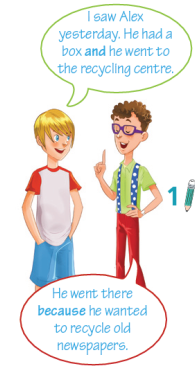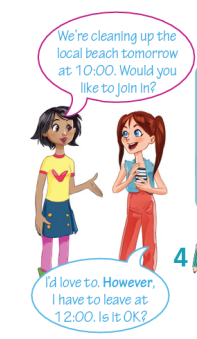Tiếng Anh 7 Unit 6 6e. Grammar1. Complete the sentences with and, or or but. 2. Rewrite the sentences using the words in brackets. 3. Start a sentence. Your partner completes it using so or because. 4. Join the sentences using the words in brackets. 5. Fill in each gap with and, or, but, so, because, although or however. 6. Start or say a sentence. Your partner continues using although or however.
Lựa chọn câu để xem lời giải nhanh hơn
and/or/but (và/hoặc/nhưng)
I saw Alex yesterday. He had a box and he went to the recycling centre.
(Tôi đã thấy Alex hôm qua. Anh ấy có một chiếc hộp và anh ấy đã đến trung tâm tái chế.)
He went there because he wanted to recycle old newspapers.
(Anh ấy đã đến đó bởi vì anh ấy muốn tái chế các tờ báo cũ.)
We use and to add information or join similar ideas. (Chúng ta sử dụng và thêm thông tin hoặc dùng cho các ý kiến giống nhau.) Big cities are crowded and they are noisy. (Các thành phố lớn đông đúc và ồn ào.) We use or to suggest an alternative (Chúng ta sử dụng hoặc đề xuất một giải pháp thay thế.) You can walk to the park or you can take the bus (Ban có thể đi bộ đến công viên hoặc bắt xe buýt.) We use but to join opposing ideas. (Chúng ta có thể nhưng cho các ý kiến đối lập.) Plastic bags are useful, but they are not eco- friendly. (Túi nhựa hữu dụng. nhưng chúng không thân thiện với môi trường.)
so/because (vì vậy/bởi vì) We use so to express a result. (Chúng ta sử dụng vì vậy để nói về kết quả. It was raining, so we couldn’t plant trees. (with a comma) (reason) -> (result) (Trời mưa, vì vậy chúng tôi đã không thể trồng cây. (có dấu phẩy.) (lý do) -> (kết quả) We use because to express a reason. (Chúng ta sử dụng bởi vì để nói về kết quả.) We couldn’t plant trees because it was raining. (without a comma) (result) -> (reason) (Chúng ta không thể trồng cây vì trời đang mưa. (không có dấu phẩy).) (kết quả) -> (lý do) Because it was raining, we couldn’t plant trees. (with a comma) (reason) -> (result) (Bởi vì trời mưa, chúng tôi đã không thể trồng cây. (có dấu phẩy).) (lý do) -> (kết quả) although/however (mặc dù/tuy vậy)
We’re cleaning up the local beach tomorrow at 10:00. Would you like to join in? (Chúng tôi đang chuẩn bị dọn dẹp cho bãi biển địa phương vào 10:00 ngày mai. Bạn có muốn tham gia cùng không?) I’d love to. However, I have to leave at 12:00. Is it OK? (Tớ muốn lắm. Tuy vậy, tớ phải rời đi lúc 12:00. Như thế ổn không?) We use although and however to express contrast. (Chúng ta sử dụng mặc dù và tuy vậy để diễn tả sự đối lập.) We use although to connect two clauses in a sentence. (Chúng ta sử dụng mặc dù để kết nối hai vế trong một câu.) Although he was tired, he continued working. (with a comma) (Mặc dù anh ấy mệt, anh ấy vẫn tiếp tục công việc. (có dấu phẩy).) He continued working although he was tired. (without a comma) (Anh ấy tiếp tục công việc mặc dù anh ấy mệt. (không có dấu phẩy).) We use however to connect two sentences. (Chúng ta sử dụng tuy vậy để kết nối hai câu.) He was tired. However, he continued working. (with a comma) (Anh ấy mệt. Tuy vậy, anh ấy vẫn tiếp tục công việc. (có dấu phẩy).)
Bài 1 1. Complete the sentences with and, or or but. (Hoàn thành các câu sau với “và”, “hoặc” hoặc “nhưng”.) 1. My school organised an environment day ________ we grew organic fruit and vegetables. 2. He went to the animal shelter, ________ it wasn’t open. 3. We can ride our bikes to school, ________ we can use public transportation. 4. He wants to build a birdhouse, ________ he doesn’t know how to do it. 5. He collected all the empty plastic bottles ________ his parents took them to the recycling centre.
Lời giải chi tiết:
1. My school organised an environmet day and we grew organic fruit and vegetables. (Trường học của tôi tổ chức ngày môi trường và chúng tôi trồng các trái cây hữu cơ và rau củ.) 2. He went to the animal shelter, but it wasn’t open. (Anh ấy đến nơi cứu hộ động vật, nhưng nó không mở.) 3. We can ride our bikes to school, or we can use public transportation. (Chúng ta có thể đạp xe đến trường, hoặc chúng ta có thể sử dụng phương tiện công cộng.) 4. He wants to build a birdhouse, but he doesn't know how to do it. (Anh ấy muốn xây nhà cho chim, nhưng anh ấy không biết cách làm.) 5. He collected all the empty plastic bottles and his parents took them to the recycling centre. (Anh ấy đã thu thập tất cả các chai nhựa rỗng và bố mẹ anh ấy đưa chúng đến trung tâm tái chế.)
Bài 2 2. Rewrite the sentences using the words in brackets. (Viết lại các câu sử dụng các từ trong ngoặc.) 1. The beach was dirty. They decided to clean it. (so) The beach was diry, so they decided to clean it. 2. The animal shelter is close to her house. She walks there. (so) ____________________________________________________ 3. There is air pollution. There are too many cars on the streets. (because) ____________________________________________________
4. There are too many endangered animals. We need to create national parks. (so) ____________________________________________________
5. The park is clean now. We organized a clean- up day. (because) ____________________________________________________
Lời giải chi tiết: 1. The beach was diry, so they decided to clean it. (Bãi biển bẩn, nên họ quyết định dọn dẹp nó.) 2. The animal shelter is close to her house, so she walks there. (Nơi cứu hộ động vật ở gần nhà cô ấy, nên cô ấy đi bộ đến đấy.) 3. There is air pollution because there are too many cars on the streets. (Không khí ô nhiễm vì có quá nhiều xe ô tô trên đường.) 4. There are too many endangered animals, so we need to create national parks. (Có quá nhiều động vật bị đe dọa, nên chúng ta cần tạo nên các vườn quốc gia.) 5. The park is clean now because we organized a clean- up day. (Công viên sạch sẽ bây giờ vì chúng tôi tổ chức ngày hội dọn dẹp.)
Bài 3 3. Start a sentence. Your partner completes it using so or because. (Bắt đầu bằng một câu. Bạn cặp của bạn sẽ hoàn thiện nó bằng vì vậy hoặc bởi vì.) A: People cut down trees,... B: People cut down trees, so our forests are in danger. (A: Mọi người chặt cây B: Mọi người chặt cây, vì vậy rừng của chúng ta gặp nguy hiểm.) Bài 4 4. Join the sentences using the words in brackets. (Nối các câu bằng các từ trong ngoặc.) 1. They left on time. They missed the train. (however) They left on time. However, they missed the train. 2. He visited the gift shop. He didn’t buy anything. (although) 3. I want to keep a cat. My parents don’t agree. (however) 4. It will rain. They will go camping. (although) 5. It was a very nice jumper. It was too expensive. (however)
Lời giải chi tiết: 1. They left on time. However, they missed the train. (Họ đi đúng giờ. Tuy vậy, họ đã lỡ tàu.) 2. Although he visited the gift shop, he didn’t buy anything. (Mặc dù anh ấy đã đến cửa hàng quà tặng, anh ấy đã không mua gì.) 3. I want to keep a cat. However. my parents don’t agree. (Tôi muốn giữ một con mèo. Tuy vậy, bố mẹ tôi không đồng ý.) 4. Although it will rain, they will go camping. (Mặc dù trời sắp mưa, họ đi cắm trại.) 5. It was a very nice jumper. However. it was too expensive. (Đó là chiếc áo khoác rất đẹp. Tuy vậy, nó quá đắt.) Bài 5 5. Fill in each gap with and, or, but, so, because, although or however. (Điền các từ và, hoặc, vì vậy, bởi vì, mặc dù hoặc tuy nhiên) 1. ________ we have got recycling bins outside our houses, we can’t put batteries in them. 2. She didn’t want use her car, ________ she went to the food bank on foot. 3. They didn’t come to the beach ________ it rained. 4. Fiona wanted to join the local animal shelter. ________, she couldn’t be there in the afternoons. 5. The street was full of rubbish, ________ they decided to clean it. 6. I went camping with my classmates last weekend ________ we had a great time. 7. Liam lives in a big city, ________ he loves the life in the countryside. 8. We’re free this morning. Let’s go for a walk ________ we can play badminton in the park.
Lời giải chi tiết:
1. Although we have got recycling bins outside our houses, we can’t put batteries in them. (Mặc dù chúng ta đặt thùng rác tái chế ngoài nhà, chúng ta không thể bỏ pin vào chúng.) 2. She didn’t want use her car, so she went to the food bank on foot. (Cô ấy không muốn dùng ô tô của cô ấy, vì vậy cô ấy đi bộ cửa hàng đồ ăn.) 3. They didn’t come to the beach because it rained. (Họ không đến bãi biển bởi vì trời mưa.) 4. Fiona wanted to join the local animal shelter. However, she couldn’t be there in the afternoons. (Fiona muốn tham gia trạm cứu hộ động vật địa phương. Tuy nhiên, cô ấy không thể ở đó tất cả các buổi chiều.) 5. The street was full of rubbish, so they decided to clean it. (Con đường đầy rác, nên họ quyết định dọn dẹp nó.) 6. I went camping with my classmates last weekend and we had a great time. (Tôi đi cắm trại với các bạn cùng lớp tuần trước và chúng tôi đã có khoảng thời gian tuyệt vời.) 7. Liam lives in a big city, but he loves the life in the countryside. (Liam sống ở thành phố lớn, nhưng anh ấy thích cuộc sống ở vùng quê.) 8. We’re free this morning. Let’s go for a walk or we can play badminton in the park. (Chúng ta rảnh vào sáng nay. Hãy đi dạo hoặc chơi cầu lông ở công viên.)
Bài 6 6. Start or say a sentence. Your partner continues using although or however. (Bắt đầu bằng một câu. Bạn cặp của bạn sẽ tiếp tục và sử dụng mặc dù hoặc tuy vậy.) A: Tony continued working … B: Tony continued working although it was late. (A: Tony tiếp tục công việc … B: Tony tiếp tục công việc mặc dù đã muộn.)
>> Học trực tuyến lớp 7 trên Tuyensinh247.com. Đầy đủ khoá học các bộ sách: Kết nối tri thức với cuộc sống; Chân trời sáng tạo; Cánh diều. Cam kết giúp học sinh lớp 7 học tốt, hoàn trả học phí nếu học không hiệu quả. PH/HS tham khảo chi tiết khoá học tại: Link
|























